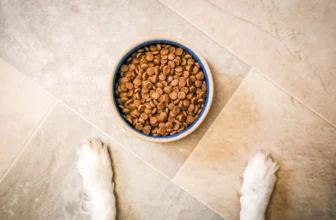Is your dog constantly scratching and biting but there are no fleas?

When we see our dogs excessively scratch our first thought is fleas, but on closer inspection or with a spot-on treatment there are no fleas.
So why is our dog scratching or biting themselves?
Sometimes we ignore it, or sometimes we visit the vet and they suggest a topical shampoo or some other remedy which only masks the symptoms rather than address the real cause.
I see this happen far too often, and will offer my experience in this article to give you some good pointers.
Most of the time the cause of scratching and biting, when the cause isn’t parasites, is your brand of dog food.
Admittedly it’s not always the case, so let’s take a good look why dogs constantly scratch and bite themselves when there are no fleas:
Why is my dog scratching and biting?
If there are no fleas in sight, your dog’s diet might be at the root of the problem.
Many pet owners don’t realise that dogs, which you should probably classify as facultative carnivores, are not built to handle large amounts of grains and fillers in their food.
Quickly put – if you feed your dog inappropriate foods, you’ll get problems. But dog food must be appropriate for a dog, right?
Well, no. In most cases it definitely isn’t.
Have you checked the ingredients in your dog’s diet?
You should also keep in mind a dog which is feeling internal pain, such as from gastrointestinal discomfort (which may also be diet-related) or any underlying illness or pain, may attempt to bite the area of pain.
Dietary sensitivities vs. food allergies
It’s important to understand the difference between dietary sensitivities and food allergies.
Most dogs don’t have true food allergies, which involve a specific immune response.
Instead, they experience dietary sensitivities, which is a reaction to foods they shouldn’t be eating anyway. These often cause itching, scratching, and biting, and the simple solution is to stop feeding those foods to your dog.
Diarrhea and gastrointestinal problems can be caused for the very same reason.
Have you noticed these symptoms after feeding your dog certain types of food?
Here’s a handy list of things to consider:
- Read the ingredients in your dog food, or if you want my advice as a canine nutritionist then read the specific review on this website.
- Consider if your dog has changed diet recently, or have you opened a new bag?
- Even if your dog has been fed the same food for a long time, just like us, they can develop a sensitivity. It can also be caused by long term feeding of inappropriate foods and symptoms are just beginning to show.
Common ingredients that could trigger itchiness
Some ingredients in commercial dog foods are known to cause dietary sensitivities. When you realise many dog foods are made almost in their entirety of these ingredients, even grains like wheat and corn, it makes you wonder why they’re included at all.
The reason, of course, is profit. Not the health of your dog.
Here’s a quick list of common food triggers which cause itching, biting, and scratching:
- Wheat
- Corn
- Soy
- Dairy products
- Chicken (for some dogs)
- Beef
- Artificial preservatives and colourings
Does your dog’s food contain any of these?
If so, it might be worth switching to a different food. Grain-free may work, but try and opt for a high-quality diet which is more meat-based than grain-based.
Limited ingredient dog foods like Taste of the Wild PREY and Canidae PURE tend to work well in easing these symptoms, but better yet take a look at the foods on the best-rated list which should really make a difference.
Could your dog’s skin be reacting to other triggers?
Aside from food, environmental allergens can also play a role.
Dust mites, pollen, and even household cleaning products could be making your dog uncomfortable. Have you recently changed their shampoo or used new cleaning products?
I would always recommend using natural cleaning products rather than chemicals. I know they don’t work as well, but if your dog licks food of your chemically-cleaned kitchen floor then you’re risking their health.
I bet you wouldn’t lick a chemically-cleaned floor!
What can you do to help your dog?
If you suspect your dog’s diet is causing the itching and biting, consider gradually switching them to a food that’s free of common triggers like grains and artificial additives.
Additionally, regular baths with soothing, hypoallergenic shampoos can help ease irritation, but you should consider these as much needed relief rather than a real solution.
When should you consult a vet?
If the scratching persists or worsens, a vet’s input is always recommended.
They can help rule out other issues, like infections or mites, and advise on the best course of action for your dog. Keep in mind a dog may try and bite themselves if they have internal pain or discomfort.
Could addressing dietary sensitivities be the key to ending your dog’s discomfort?
With a little adjustment to their diet and environment, you may be able to bring much-needed relief to your furry friend.

Join the Reddit community r/HealthyAussiePets






